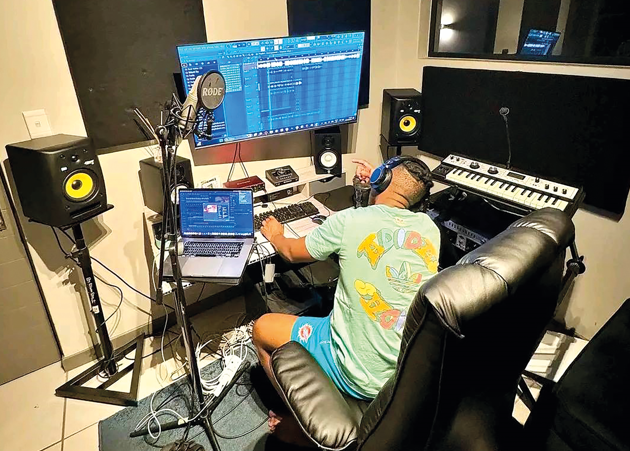… Navigating Lesotho’s music industry crossroads
In Lesotho’s growing but still largely under-resourced music scene, artists face a pivotal decision: to sign with a record label or build a career independently.
The choice carries major implications for creative freedom, revenue ownership, and long-term sustainability. While the rise of digital distribution platforms has shifted the power dynamics in favour of artists globally, the lure of a record deal remains strong in Lesotho, where infrastructure is limited and access to professional networks is scarce.
Historically, record labels have provided financial backing, production resources, and crucial access to media, promoters, and audiences. In a market like Lesotho’s, with few studios and even fewer promotional platforms, this support can be life-changing.
The late Malome Vector’s success through South Africa’s Ambitiouz Entertainment is a telling example. With the label’s support, his music reached audiences well beyond Lesotho’s borders, earning regional airplay and acclaim.
However, this kind of success often comes with strings attached. In South Africa, artists like Emtee and Amanda Black have spoken publicly about contract disputes and a lack of financial transparency within major labels. Many have shared experiences of being locked into restrictive agreements that compromised their creative control and limited their income.
Local Maseru-based producer T-Mech weighed in, saying, “Most young artists don’t know how to read contracts. They just want to record and tour. But later they realise they don’t own their music. The music business involves more than just recording a song, there are contracts and agreements most artists don’t understand.”
Indeed, the digital revolution has democratised music distribution. Platforms like YouTube, Spotify, and Apple Music allow artists to reach global audiences without label backing. Affordable services like DistroKid and TuneCore make it possible to access royalties and track listener data independently.
Yet, despite these tools, many emerging artists still opt for label deals. Unfortunately, they often enter these agreements with excitement rather than understanding, a trend recently highlighted by developments at Ntate Stunna’s Penya Play and Sannere’s Mets’oaka Group. Both artists discovered the harsh realities of running a record label.
In late 2024, Penya Play parted ways with artist Cheez Beezy, producer DeejayZaca, and in-house videographer Mpho Tau. While details were initially unclear, subsequent statements revealed contractual conflicts as the root of the fallout.
In January 2025, Sannere launched Mets’oaka Group, a move welcomed by fans. The label brought together notable names like Phoka Ea Boroa, Litsepe, Qhomane, Teddy DJ, videographer Teho, and producer Flash Cortez, and was managed by Moeketsi Pius Kebise.
But things soon turned turbulent. Kebise resigned, citing conflict with the label’s ownership. Before him, Flash Cortez had exited, and this week, Teho followed suit for similar reasons. Unconfirmed reports suggest Qhomane may also have left the label.
Artists like Leomile and Kommanda Obbs have shown that independence is viable. Leomile, with her distinct fusion of Sesotho storytelling and modern instrumentation, has built a niche audience while preserving her creative identity. These examples suggest that, with strategic branding and consistency, independent artists can sustain meaningful careers.
To further understand the local landscape, we spoke to Sir Schaba of YME Tunes, who emphasised that, “A lot of our artists don’t understand the work of a record label. For most, it’s just about the clout of being signed, without understanding the responsibilities that come with it.”
He added, “The biggest challenge is that the market is very limited. Even with thousands of followers, it’s difficult to track audience locations and engagement. That’s where record labels come in—they have the resources and connections. We still need them, especially in our context.”
However, he cautioned against artists becoming label owners, saying, “A label is a separate entity that should operate independently. But many artist-owners struggle to separate themselves from the label’s operations. Everyone wants to be the top dog, so they tend to focus on themselves instead of nurturing the other artists in the stable.”
T-Mech echoed this sentiment, noting that, “Labels offer support, but often restrict freedom. Independent artists who are willing to invest in quality production and marketing can succeed on their own terms.”
Lesotho’s music industry still contends with structural limitations: a small domestic market, limited media platforms, few live venues, and minimal government support. These realities make record labels, especially those based in South Africa, attractive to many Basotho artists seeking broader exposure.
A hybrid approach may offer a viable path forward. Distribution deals, licensing agreements, and freelance management can allow artists to retain rights while accessing professional resources. Education remains key. Music workshops, industry unions, and legal training could empower artists to make informed decisions.
There is no one-size-fits-all solution. For some Basotho musicians, signing with a label might be the boost they need. For others, independence offers the freedom to build a lasting, authentic brand. What matters most is informed decision-making, strategic planning, and a clear understanding of the trade-offs.
In Lesotho’s evolving music scene, the future belongs to those who can navigate both opportunity and risk with equal parts ambition and caution.
Summary
- While the rise of digital distribution platforms has shifted the power dynamics in favour of artists globally, the lure of a record deal remains strong in Lesotho, where infrastructure is limited and access to professional networks is scarce.
- To further understand the local landscape, we spoke to Sir Schaba of YME Tunes, who emphasised that, “A lot of our artists don’t understand the work of a record label.
- Everyone wants to be the top dog, so they tend to focus on themselves instead of nurturing the other artists in the stable.

A Professional Communications practitioner with a wealth of expertise in marketing, public speaking, communication and media relations. I believe in learning everyday and improving one’s personal and professional capabilities.
* A former journalist and radio host who is passionate about media and it’s impact on society.







